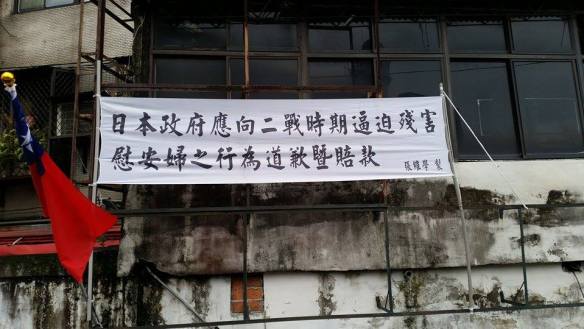Spotted this sign recently just beside the Zhongzheng Bridge between Yonghe and Taipei:

It reads:
The Japanese government should apologize and provide reparations for coercing comfort women during World War II
Created by Wei-Shyue Chang
The subtext of this sign is the recent Taiwanese history textbook controversy over proposed changes to the high school curriculum which pushed for a (slightly) less rosy view of the period of Japanese colonial rule in Taiwan, including using the term coercion when it came to the comfort women issue, amongst other changes largely incomprehensible in the English translation.
It’s not the first time I’ve seen signs in this spot. In September 2012 this sign was posted:

The Diaoyu Islands belong to Taiwan
The Diaoyu Islands, also called the Senkaku Islands, are disputed islands in the South China Sea currently administered by Japan, but also claimed by the Republic of China (Taiwan) and China. For many Republic of China (as opposed to Taiwan) nationalists, the Diaoyu Islands are critical to their national pride.
And more recently in November of this year around the same spot was:
https://www.instagram.com/p/92I4Otqf0a/
This is a bit of wordplay, as 「挺住」(ting2zhu4) means “to stand firm against adversity”, while 「柱」(zhu4). a homonym for 「住」. here refers to Hung Hsiu-chu (洪秀柱), the author of an aborted presidential campaign for the KMT, so it can also be read as “Support Hung Hsiu-chu”. She was replaced by Kuomintang chairman Eric Chu (朱立倫) as the KMT candidate after a campaign referred to as the 「換柱」(huan4zhu4) movement. This itself is another instance of wordplay – in that 「換柱」 means change a pillar (of a building). As author and architect Roan Ching-yue goes into in the eRenlai interview below, Chinese buildings were traditionally built of wood, so every so often you would have to replace rotten timbers and supporting pillars in an attempt to stop the house decaying.
As the second character of Hung’s given name literally means “pillar”, the phrase “change the pillar” was adopted in an attempt to oust Hung from running for president.
So who is the man behind all these signs? I’m not sure about all the signs, but this one is labeled Wei-Shyue Chang. The director general of the Association of ROC Veterinarians and senior vet at Jinhua Animal Hospital. You can check out his Facebook profile below and I suggest it as he seems to be quite a character:
How did everyone find the election? The majority of people I’ve met since I’ve been in Taiwan didn’t vote for Tsai Ing-wen yet (I’ve been asking). One guy I met said he’d been put off Tsai Ing-wen previously when he interviewed her, as he said he thought she changed her opinions with changes in the wind. I met another woman who voted for Eric Chu – she didn’t expand on her reasons though. (I realize I shouldn’t ask, but can’t help letting my curiosity getting the better of me.) I met one taxi driver who voted for Tsai, but seemed more passionate about the Democratic Progressive Party (DPP) rather than Tsai herself. For some quality post-election analysis you can visit the Frozen Garlic blog here.


I find that in general, DPP voters are much more vocal in Western media. Many KMT supporters, including my girlfriend are these days afraid to come out lest to be berated heavily for having a differing view.
Hi Michael, I know what you mean. I think (moderate) blues tend to keep it quite quiet, but will occassionally scoff at DPP idealism or murmur something about waiting to see how things work out down the road. I really liked Li Ang’s Everyone Chews on Sugarcane by the Side of the Road due in part to her disillusion with how the DPP ideology developed after democratization, while still acknowledging the problems with the KMT. I think Michael Turton is a good blogger in this sense too in that he’s not afraid to go after both sides with equal venom. I always find it hard to tell if the DPP are particularly that much more socially responsible or leftish than the KMT or if they’re still mostly driven by Minnan nationalism. Maybe that will change with Tsai though. What’s your impression of the status quo.
Cheers,
the turning point for me on not being able to understand the Hoklo nationalism is their view on comfort women…it’s disgusting that these women are losing their chance at justice because of Hoklo nationalism.
There’s idealogues on both sides definitely, you just have to engage with the people in between I guess
Pingback: Another Year Another Sign: Vet Wei-shyue Chang Opposes Radioactive Imports from Japan 張維學又在反對 | Translating Taiwanese Literature
Pingback: Eric Chu gets called out on Zhongzheng Bridge | Translating Taiwan